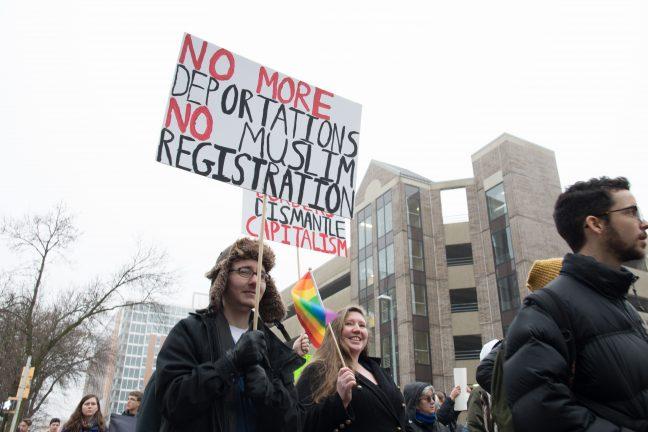On Thursday morning, protesters gathered outside the capitol to protest Wisconsin Senate Bill 275. This bill, introduced in May by Sen. Steve Nass, R-Whitewater, Sen. Duey Stroebel, R-Saukville, Sen. David Craig, R-Town of Vernon, and Sen. Leah Vukmir, R-Brookfield, would ban sanctuary cities in the state of Wisconsin.
Under the bill, local law enforcement would be required to help federal agencies deport any suspected illegal immigrants they arrest.
Proponents of the bill argue it targets solely illegal immigrants who have committed a crime and that it would not lead to police actively seeking out illegal immigrants to deport.
“Contrary to claims of opponents, sanctuary cities do not make our communities safer. These politically correct policies actually increase the risk to public safety in order to make a political statement regarding federal immigration laws,” Nass said.
Point Counterpoint: Make America a nation of immigrants again
Opponents disagree, citing the bill’s unconstitutionality and arguing that, contrary to Republican rhetoric about making Wisconsin safer, the bill will in fact do the opposite. Chase Terrier, public policy coordinator for End Domestic Abuse Wisconsin, argues that the bill will discourage victims of domestic abuse who are illegal immigrants to come forward, as they risk their partner or themselves getting deported.
“[The bill will] lead to a dramatic decrease in the willingness of crime victims to reach out to law enforcement, meaning violent offenders will continue their abusive behavior unimpeded,” Terrier said.
Sanctuary cities, while having no strict legal definition, are often thought of as a municipality or community in which law enforcement officials do not inquire about the immigration status of individuals during contact. Both the University of Wisconsin and the City of Madison, while not perfectly fitting this definition, are considered more sanctuary city than not.
UW Chancellor Rebecca Blank does not wield the power to declare a sanctuary campus designation, but she repeatedly reiterated the university’s longstanding policy to not assist the Immigration and Customs Enforcement (ICE) following President Donald Trump’s election and subsequent tirade against immigrants and illegal aliens.
The Republican argument stemming from Trump and other bigots that illegal immigrants running rampant in sanctuary cities commit crime after violent crime is not based in any real fact. On the contrary, immigrants who are in the United States illegally tend to commit fewer crimes because they fear deportation.
“In the U.S. context, most second-generation immigrants continue to enjoy lower crime rates than the native-born population,” writes University of Alberta associate professor Sandra Bucerius.
Additionally, the American Immigration Council found in 2015 that the recent rising period of immigration spanning the past 25 years corresponds with plummeting crime rates nationwide, once again dispelling the weak Republican argument that illegal immigrants are wreaking havoc across America.
Senate bill 275 is nothing more than a thinly veiled Republican attempt to homogenize American society to fit their vision of an America that is white, Christian and uber-conservative. It’s a mythical norm that has not existed in this country at any point in its history; Native Americans, African American slaves and immigrants streaming in first from Northern Europe but later from Eastern Europe and Asia gave this country its once-celebrated title of “melting pot.”
Republican lawmakers both in Wisconsin and nationally need to understand that America is great because of its diversity and the opportunities it grants immigrants, both legal and illegal, to escape from dire living conditions and craft a life that benefits themselves, their children, and ultimately the country.
Aly Niehans (aniehans@badgerherald.com) is a sophomore majoring in international studies and intending to major in journalism.


